Your cart is currently empty!
BYLAWS OF ORDO LUX
get annointed.
Activate those good vibes and balance your energy with our handmade, organic healing tinctures

Sage Smudging Kit
Blessed by Minister Enid

Holy Annointing Oil
Consecrated by Minister Enid

Aloha Wai Noni Drops
Handmade in Hawaii

Holy Water
Patent Pending!
protect your legacy.
Grab extra copies of your memorandums in case of loss or damage, or to share with family members.
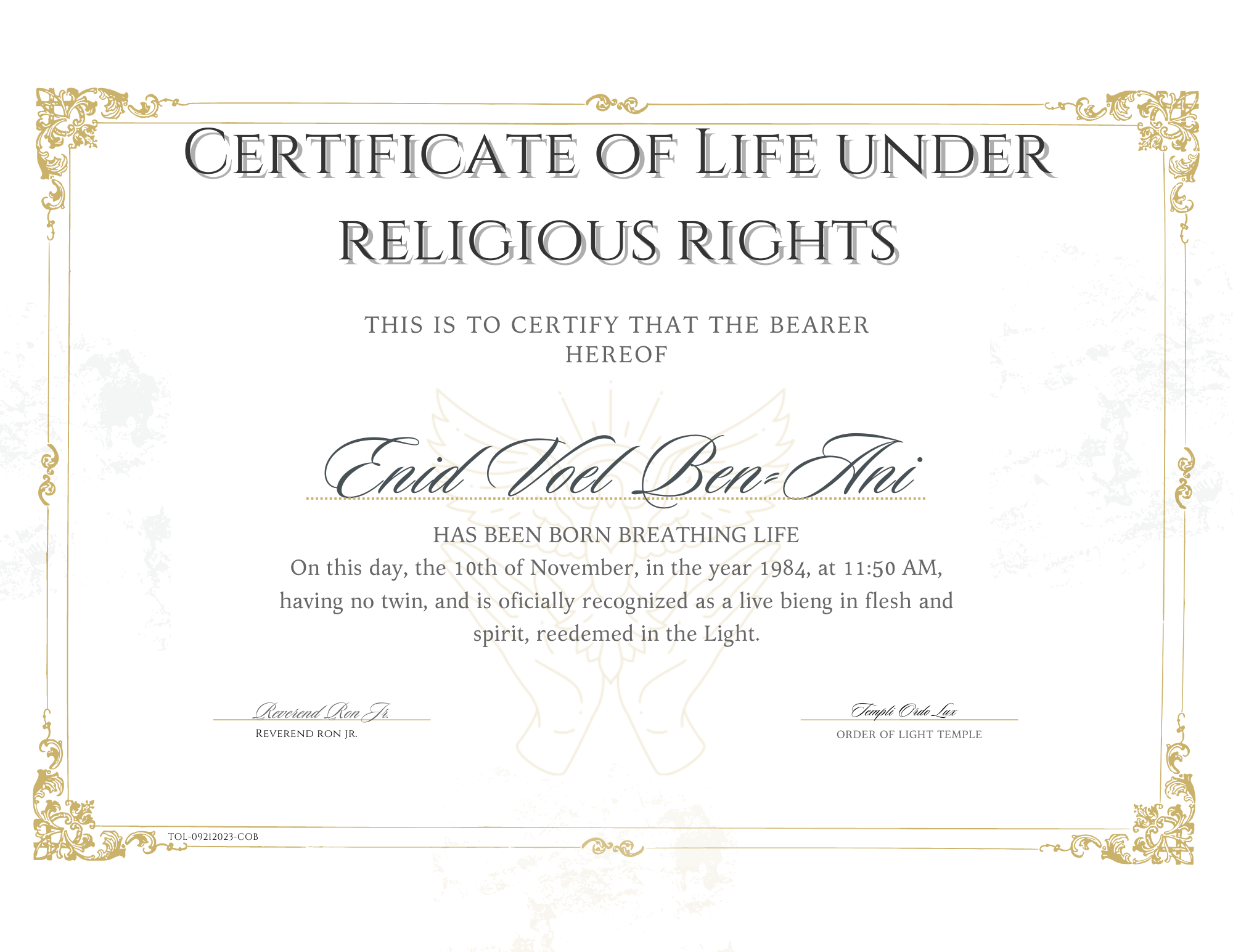
Certificate of Life
Religious Memorandum of Childbirth
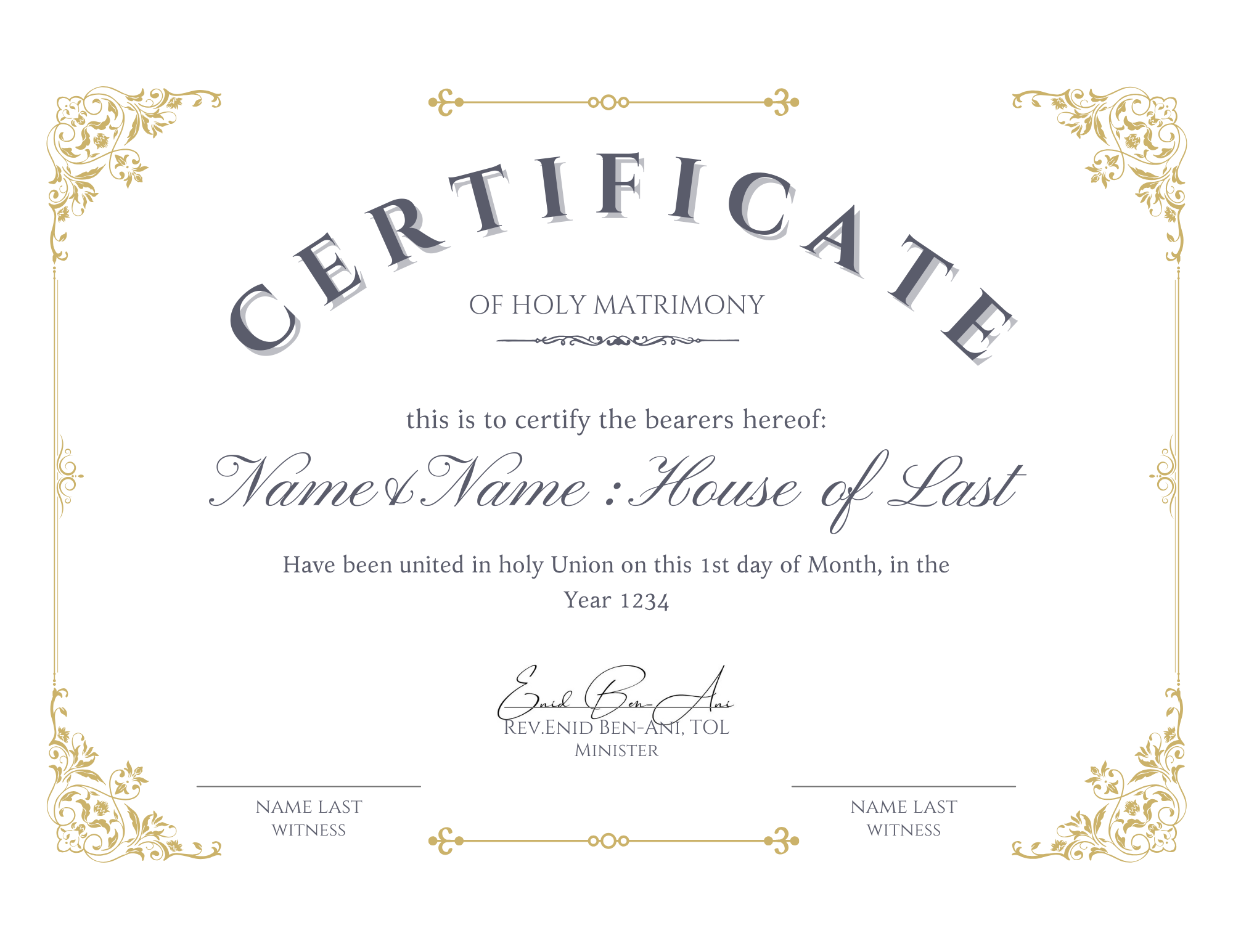
Certificate of Matrimony
Declaration of Union
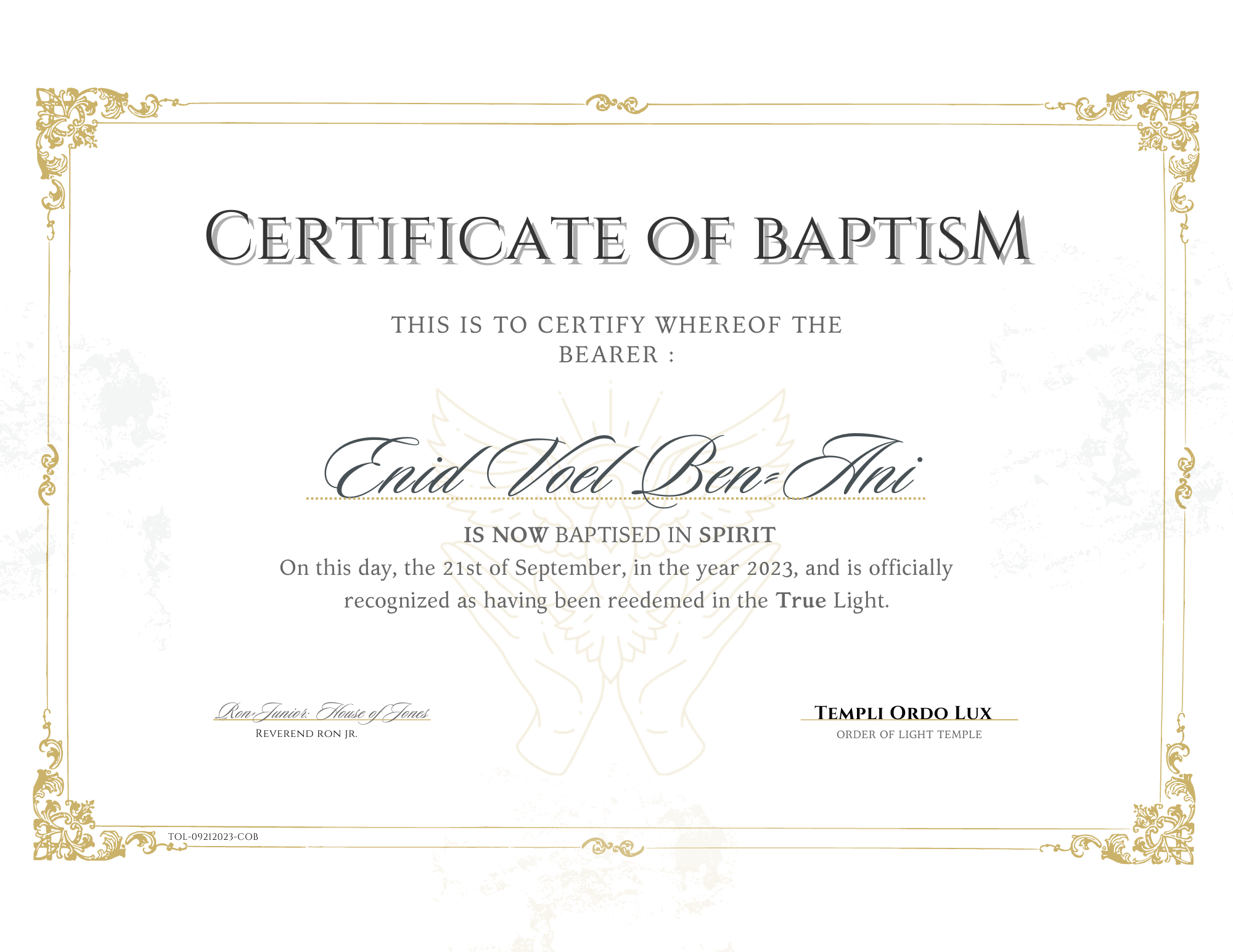
Baptism
Certification of Baptism in Spirit
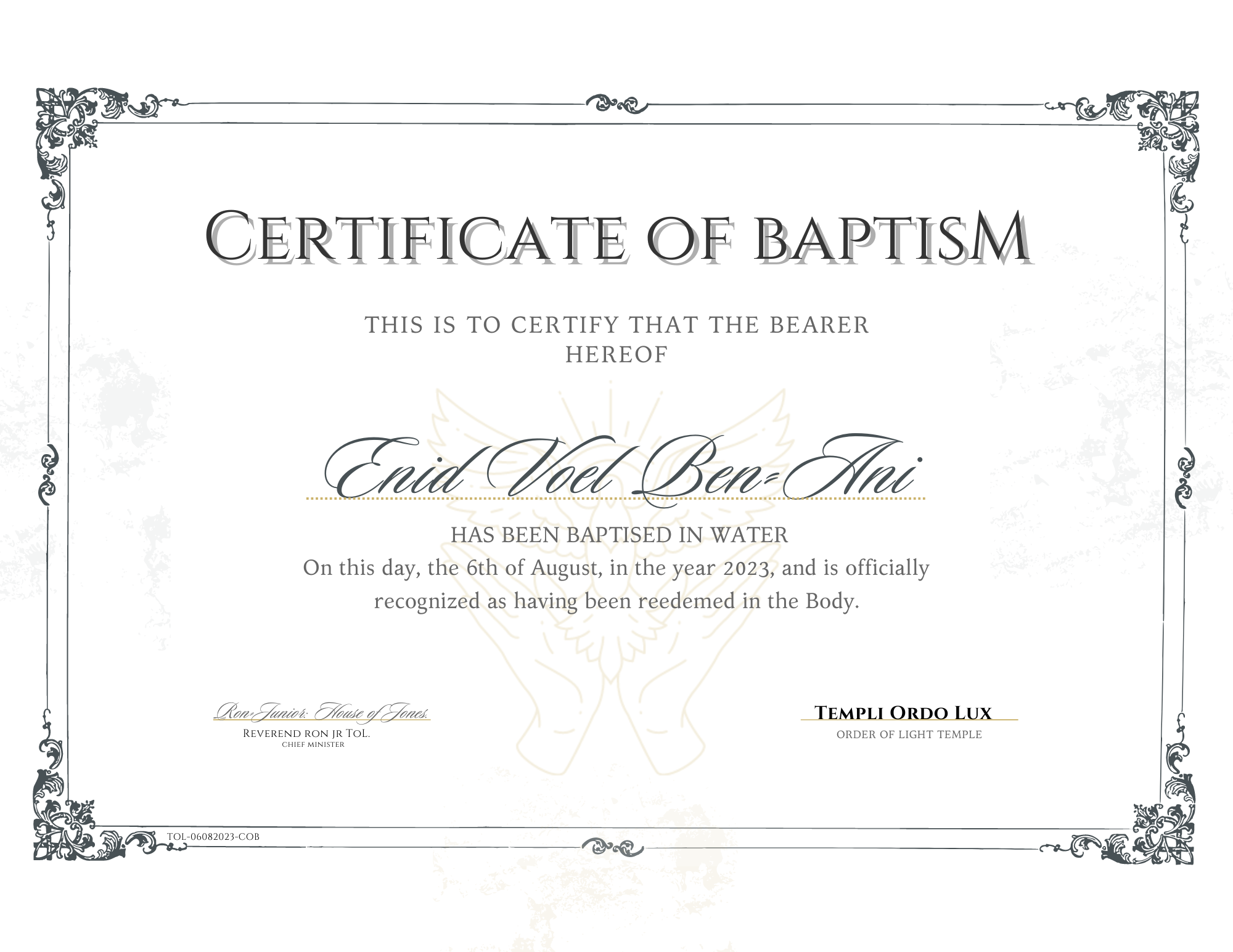
Immersion Baptism
Certificate of Baptism in Water
grab some wisdom.
Expand your awareness with these powerful books by our Minister.

The Blueprint
Creating the post social-apocalypse man

The Soul
Exploring the Layers of Your Being

Forbidden Flames
Discover the Great Mother Kundalini
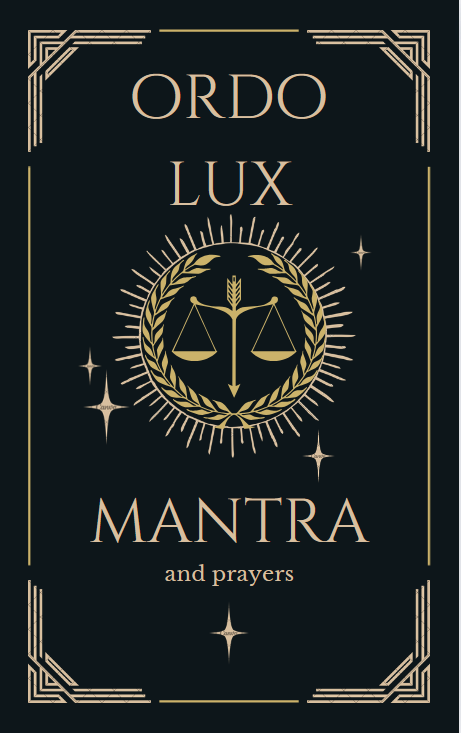
Mantva and Prayers
Meditations, Mantras, and Prayers of the Temple
join our team.
Become a Minister now to help usher in Heaven on Earth, or become an ambassador of The Nation of Luxton, our Micronation and protect your freedom, build a community, and end human peonage.
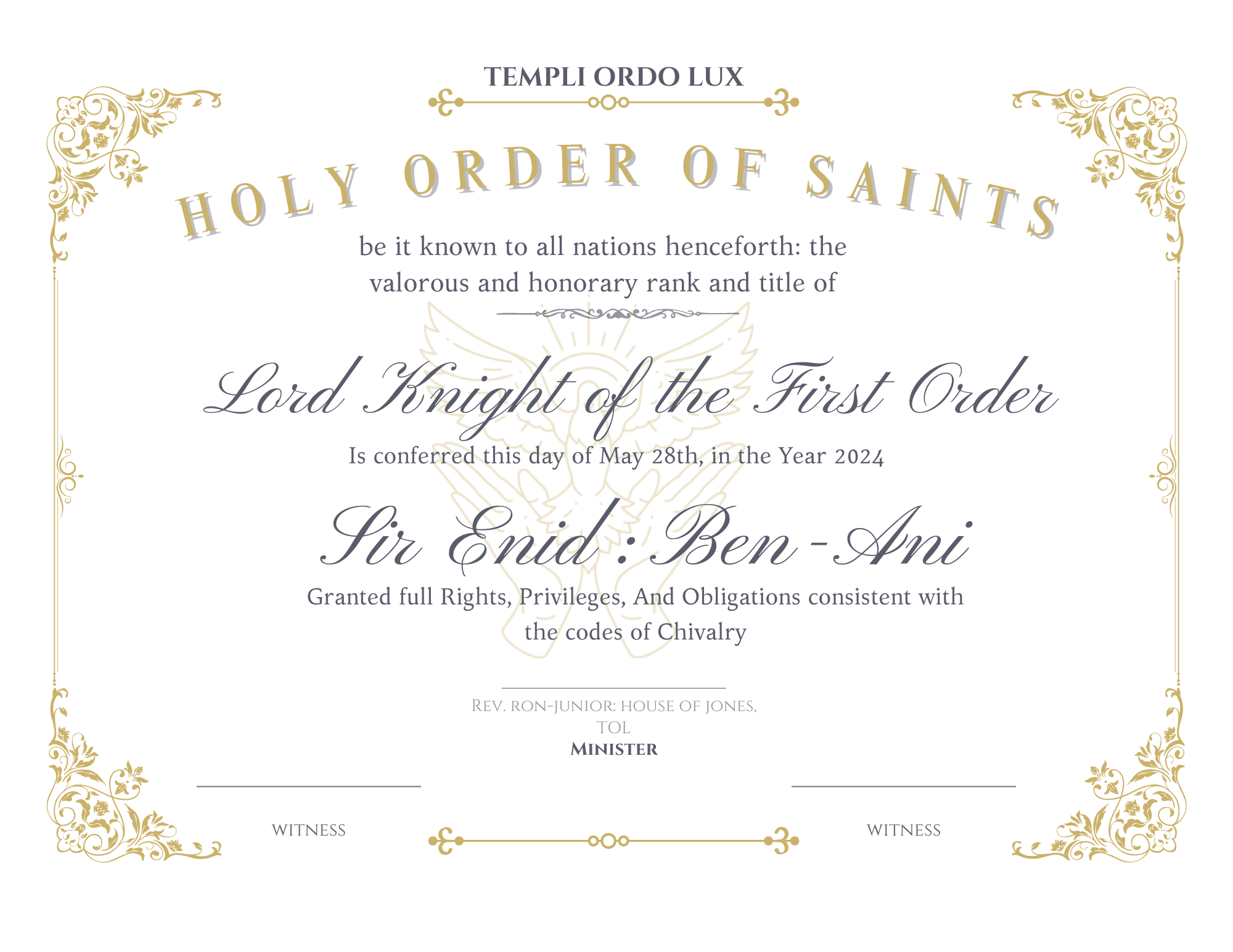
Holy Order of the Saints
Lord Knight of the First Order
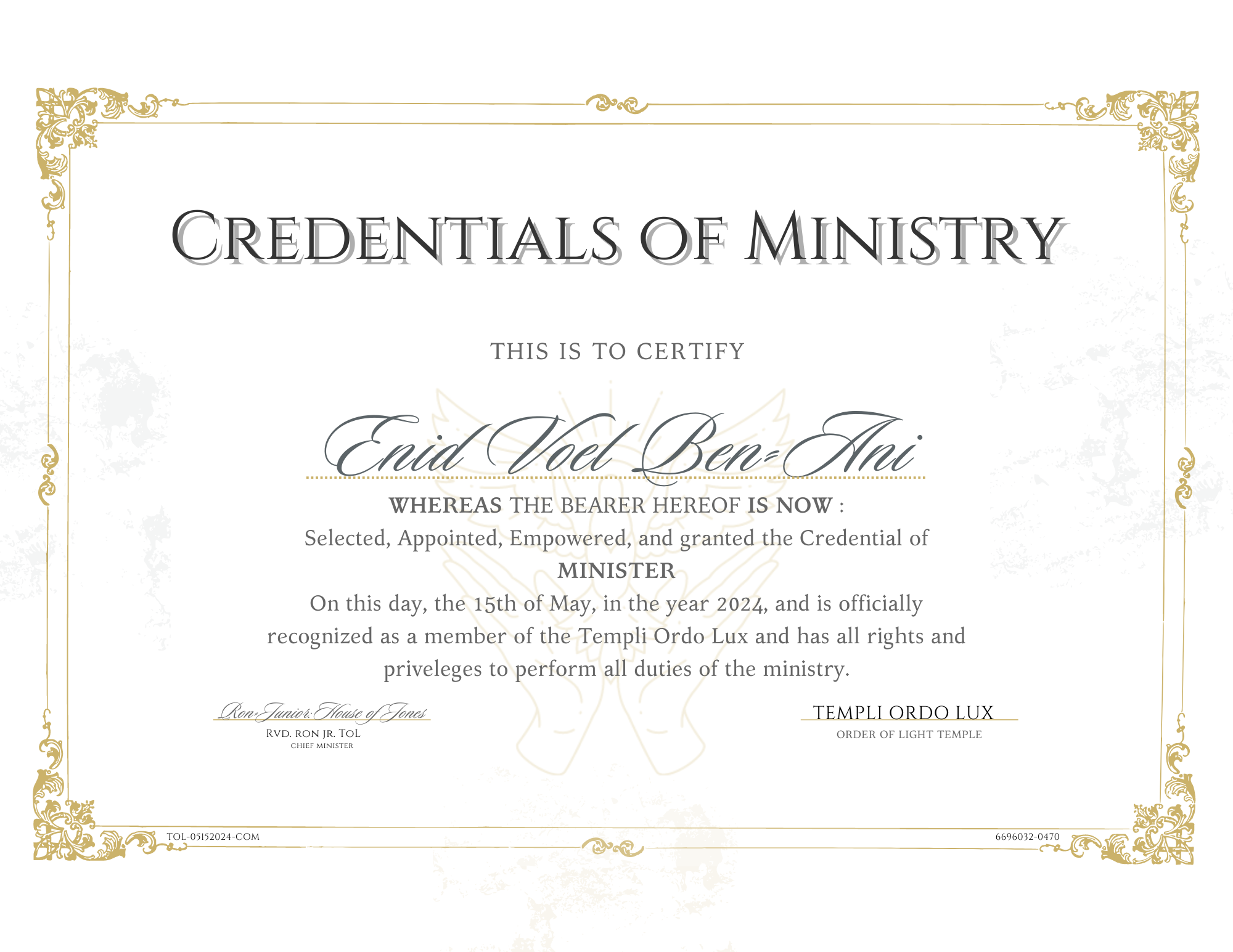
Credentials of Ministry
Become an Ordained Minister
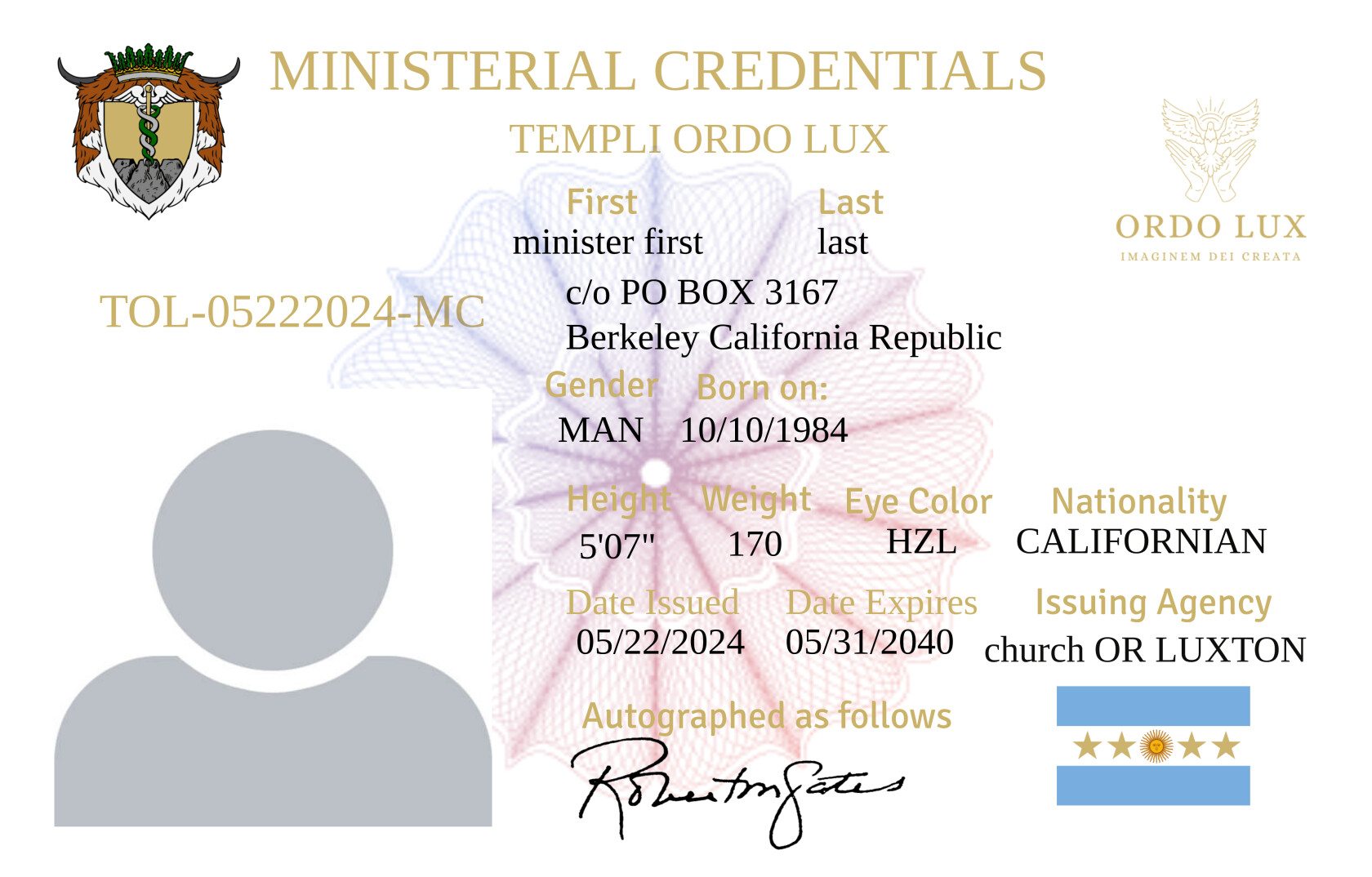
Ministerial Credentials
Special Access ID

Ambassador CredentialsURL
Get Special Access via QR Code
legals
Just so you know that we are operating legit.
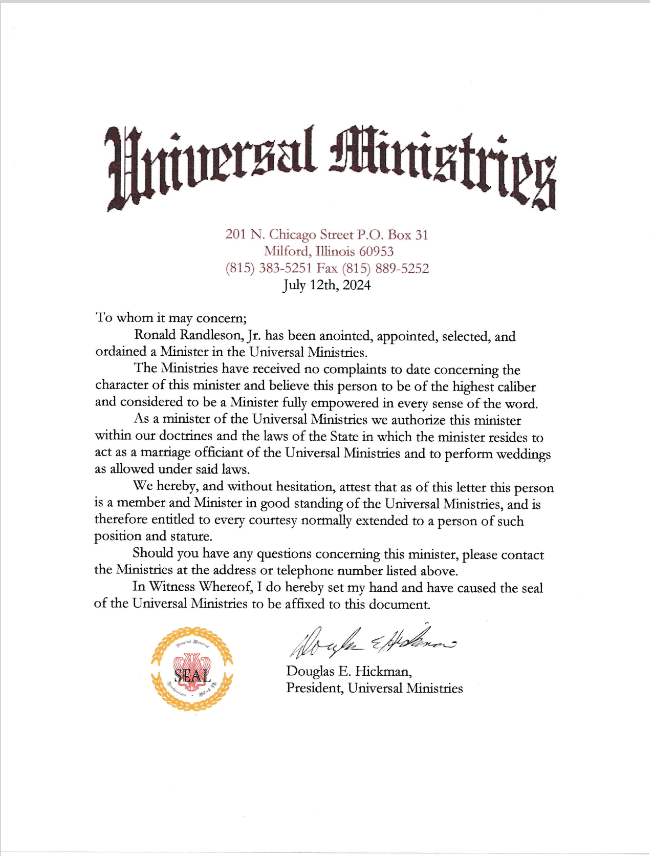
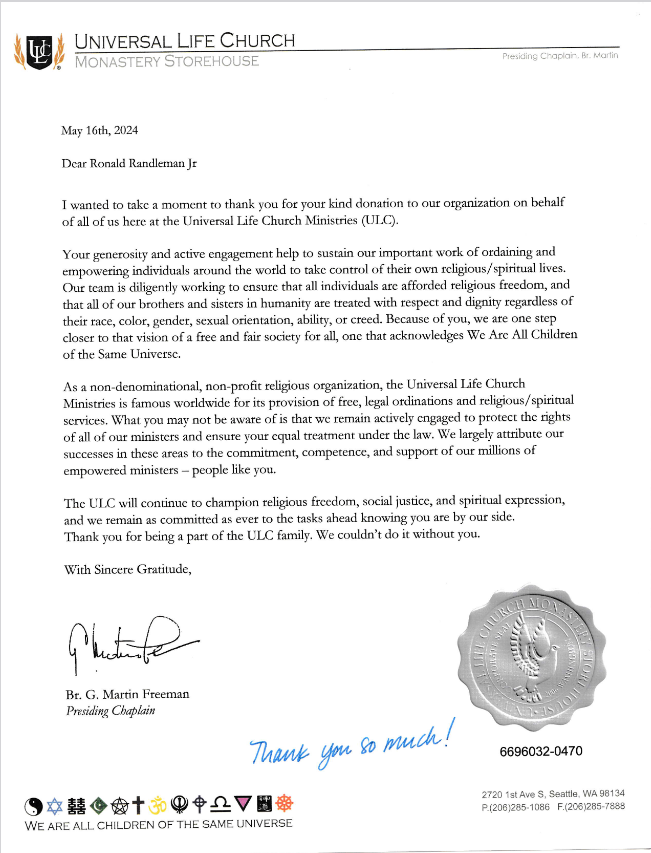
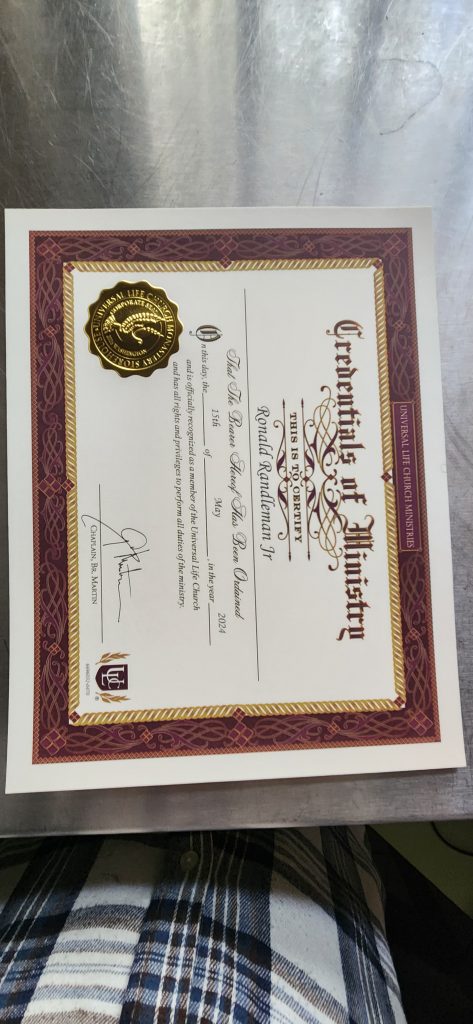
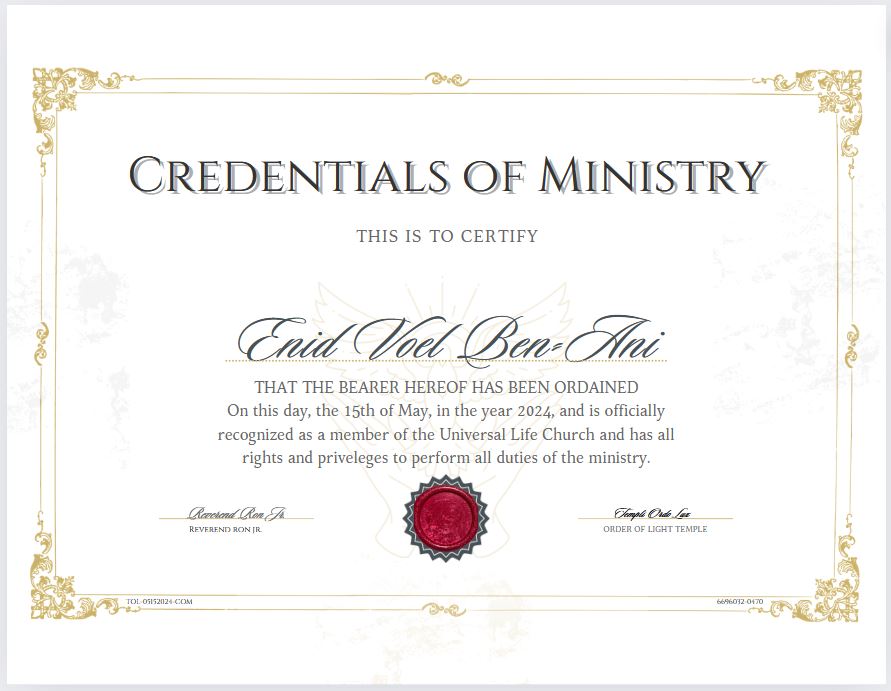
FAQs
CONSTITUTION AND BYLAWS
of the
TEMPLI ORDO LUX
Luxtonia, Nation of Luxton
Adopted this 26th day of May 2024

and the Way
PREAMBLE
For the purpose of establishing and maintaining a place for the worship of The Ineffible, Our GOD-Mother and Father, to provide for fellowship for those of like precious faith, where the Holy Spirit and all Mysteries may be distilled and be honored according to our distinctive testimony; to assure our share of responsibility and the privilege of propagating the gospel of the Christ, the Muse, and the Great Mother by all available means, both at home and in foreign lands; we, whose names appear upon the assembly roster under above date, do hereby recognize ourselves as a local assembly in fellowship with and a part of the Chiefs of the Grand Council and of the Nation of Luxton; and declare that we hereby adopt the following articles of temple order and submit ourselves to be governed by them.
CONSTITUTION
ARTICLE I. NAME
The name of this temple shall be The “Ordo Lux” Temple in the
California Republic.
ARTICLE II. OFFICES
Section 1. The registered office of the organization shall be at: 3175 Adeline Street, suite 3617. The registered agent in charge thereof shall be: Randleman National Bank E&T.
Section 2. The organization may also have offices at such other places as the Board of Deacons may from time to time appoint or the business of the organization may require.
ARTICLE III. SEAL
The Official Seal shall have inscribed thereon the name Templi Ordo Lux, the Year 5784 and the words “Not For Profit” ,”SEAL” and “LUXTON”.
ARTICLE IV. PREROGATIVES
Section 1.
This Ordo Lux temple shall have the right to govern itself according to the standards of the New Testament Scriptures, “endeavoring to keep the unity of the Spirit in the bond of peace… till we all come in the unity of the faith and of the knowledge of the Son of God, unto a perfect man, unto the measure of the stature of the fullness of Christ”.
(Ephesians 4:3,13)
And to unite the lost sparks and lift their light back to the Ineffible True Living God.
Section 2.
In connection therewith, or incidental thereto, it shall have the right to purchase or acquire by gift, bequest, or otherwise, either directly or as trustee, and to own, hold in trust, use, sell, convey, mortgage, lease, or otherwise dispose of any real estate or chattels as may be necessary for the furtherance of its purposes; all in accordance with its constitution andbylaws or as the same may be hereafter amended.
( All Scriptures references or quotations are from the King James Version, unless otherwise noted.)
ARTICLE IV. CREED
The Church subscribes, and its object is and purposes are that all of Mankind may subscribe to and practice the following Creed:
“WE, THE ORDER OF LIGHT BELIEVE:
That all men of whatever race, color or creed were created with equal rights.
That all men have inalienable rights to their own religious practices and their performance.
That all men have inalienable rights to their own lives.
That all men have inalienable rights to their sanity.
That all men have inalienable rights to their own defense.
That all men have inalienable rights to conceive, choose, assist and support their own organizations, churches and governments.
That all men have inalienable rights to think freely, to talk freely, to write freely their own opinions
and to counter or utter or write upon the opinions of others.
That all men have inalienable rights to the creation of their own kind.
That the souls of men have, the rights of men.
That the study of the mind and the healing of mentally caused ills should not be alienated from
religion or condoned in nonreligious fields.
And that no agency less than God has the power to suspend or set aside these rights, overtly or
covertly.
AND WE OF THE ORDER OF LIGHT BELIEVE:
That man is basically good.
That he is seeking to survive.
That his survival depends upon himself and upon his fellows, and his attainment of brotherhood
with the Universe
AND WE THE ORDER OF LIGHT BELIEVE THAT THE LAWS OF THE INVISIBLE CREATOR FORBID MAN:
To destroy his own kind
To destroy the sanity of another
To destroy or enslave another’s soul
To destroy or reduce the survival of one’s companions or one’s group.
AND WE OF THE ORDER BELIEVE:
That the spirit can be saved and That the spirit alone may save or heal the body.
ARTICLE V. AFFILIATION AND RELATIONSHIP
Section 1. Declaration
This Organization declares itself to be voluntarily independent upon the land in the continental North America. As a member of the Grand Council, this assembly agrees to:
a. Cooperate by every possible means in the extension of God’s work and kingdom throughout the world;
b. Support the missionary program agreed upon by the Chief Council and Council of Covenantees;
c. Participate in Chief Council and Council of Covenantees sessions via duly chosen delegates;
d. Invite the counsel of the district officers when changing pastors and in the event of temple difficulty;
e. Share in the support of the Chief Council and Council of Covenantees. (See Grand Council Bylaws, 05302024-BYL);
f. Recognize that the Council of Ordo Lux shall have the right and authority to:
* Approve scriptural doctrine and conduct;
* Disapprove unscriptural doctrine and conduct, as stated in the Grand Council constitution; and
* Withdraw its certificate of membership if deemed necessary.
Section 2. Affiliation
Whereas, if this Organization becomes officially affiliated with the fellowship of this California Republic with a District Official present, it shall be understood that if this Assembly desires to withdraw from the District, it will notify the District at least two weeks before such action is taken, and the District shall be properly represented at the meeting called for such a purpose.
ARTICLE VI. TENETS OF FAITH
Section 1. Accepted Scriptures
This Organization accepts the Holy Scriptures as the revelation of the Logos, and the tenets to wisdom and justice. ALongside these texts, we also compile the principals from the following (but not limited to:)
The Ahuramazda
The Septuagant
The Mishna
The Zohar
The Black Brick
The Greek Magical Papyri
The Path with the Way
The Solomonic Texts
The Library of Julian
The Library of Alexandria
The Nag Hammadi Texts
The GnosticHarmozel, also called Armozel is one of the four Great Light… More Library
The Books of IEU
The Vedas and Upanishads
The Eleusinian Mysteries
Section 2. The Scriptures Inspired
The Scriptures, both the Old and New Testaments as well as the apocryphal texts, are verbally inspired of God and are the revelation of God to man, the infallible, authoritative rule of faith and conduct (2 Timothy 3:15-17; 1 Thessalonians 2:13; 2 Peter 1:21);
The Vedas and Hindu/Buddhist Scriptures state the proper means to manifest good conduct and karma, how to meditate and commune with the Spirit and Ineffible;
The Golden Dawn Materials and other Theosophic Materials show us ancient wisdom and how to develop the Soul for Union with the HGA;
And Magickal Texts teach us how to forage, commune in nature, create oils of annointing, tinctures to heal, and create blessings to purify us and our brethren.
Section 3. The True, Ineffible God
The one true God has revealed itself as the eternally self-existent ‘I AM,’ the Creator of heaven and earth and the Redeemer of mankind. IAM has further revealed itself as embodying the principles of relationship and association as Father, Son, and Holy Spirit
(Deuteronomy 6:4; Isaiah 43:10,11; Matthew 28:19; Luke 3:22).
Section 4. The Fall of Man
Man was created good and upright; for Elohim said, “Let us make man in our image, after our likeness.” However, man by voluntary transgression fell and thereby incurred not only physical death but also spiritual death, which is separation from God (Genesis 1:26, 27; 2:17; 3:6; Romans 5:12-19).
Section 5. The Salvation of Man
Man’s only hope of redemption is through the spirit and by crossing the abyss.
a. Conditions to Salvation.
Salvation is received through repentance toward God, good Works and faith toward the Light of Christos(Greek) Christos or ‘‘Christ’’ is a word literally s… More. By the washing of regeneration and renewing of the Holy Spirit, being justified by grace through faith, man becomes an heir of God according to the hope of aeonic life (Luke 24:47; John 3:3; Romans 10:13-15; Ephesians 2:8; Titus 2:11; 3.5-7).
b. The Evidences of Salvation.
The inward evidence of salvation is the direct witness of the Spirit (Romans 8:16). The outward evidence to all men is a life of righteousness and true holiness (Ephesians 4:24; Titus 2:12).
Section 6. The Ordinances of the Temple
a. Baptism.
Section 1. The ordinance of baptism by immersion is commanded in the Scriptures. All who repent and believe on the Christ as Savior and Lord are to be baptized. Thus they declare to the world that they have died to the World with Christ and that they also have been raised with Him to walk in newness of life. (Matthew 28:19; Mark 16:16; Acts 10:47, 48; Romans 6:4).
Section 2. The baptism of Water is followed by the baptisms of air, fire, and spirit, and the ritual is completed with the Removal of The Powers of the Archons (Books of Jeu and Untitled Codex). One must prepare for these rituals by adhering to the tenets of Yeshua as inscribed in the Pistis Sophia, Gospel of Peace, and other texts.
b. Holy Communion.
The Lord’s Supper, consisting of the elements—bread and the fruit of the vine—is the symbol expressing our sharing the divine nature of Christ (2 Peter 1:4); a memorial of His suffering and death (1 Corinthians 11:26); and a prophecy of His second coming (1 Corinthians 11:26); and is enjoined on all believers “till He come!”
Section 7. The Baptism in the Holy Ghost.
A. Entitlements to Baptism
All Believers are entitled to and should ardently expect and earnestly seek the promise of the Father, the baptism in the Holy Spirit and fire, according to the command of Yeshua. This was the normal experience of all in the early Christian temple. With it comes the enduement of power for life and service, the bestowment of the gifts and their uses in the work for the ministry (Luke 24:49; Acts 1:4,8; 1 Corinthians 12:1-31). This experience is distinct from and subsequent to the experience of the experience of the new birth (Acts 8:12-17; 10:44-46; 11:14-16; 15:7-9). With the baptism in the Holy Spirit come such experiences as an overflowing fullness of the Spirit (John 7:37-39; Acts 4:8), a deepened reverence for God (Acts 2:43; Hebrews 12:28), an intensified consecration to God and dedication to His work (Acts 2:42), and a more active love for Christ, for His Word, and for the lost (Mark 16:20).
B. The Evidence of the Baptism in the Holy Ghost
The baptism of believers in the Holy Ghost is witnessed by the initial physical sign of speaking with other tongues as the Spirit of God gives them utterance (Acts 2:4). The speaking in tongues in this instance is the same in essence as the gift of tongues (1 Corinthians 12:4-10, 28), but different in purpose and use, such as Enochian, Ancient Eyptian or Ancient Greek.
Section 8. Sanctification
- Sanctification is an act of separation from that which is evil, and of dedication unto God (Romans 12:1, 2; 1 Thessalonians 5:23; Hebrews 13:12). Scriptures teach a life of “holiness” without which no man shall see the Lord” (Hebrews 12:14). By the Power of the Holy Spirit we are able to obey the command: “Be ye holy for I am holy” (1 Peter 1:15-16).
Sanctification is realized in the believer by recognizing his identification with Christ in their death and resurrection, and by faith reckoning daily upon the fact of that union, and by offering every faculty continually to the dominion of the Holy Spirit (Romans 6:1-11, 13; 8:1, 2, 13; Galatians 2:20; Philippians 2:12,13; 1 Peter 1:5).
- Consecration and Rituals, when performed by a member of the Order, must be done in compliance with the “Rules For Members”, “Rituals and Sacraments”, and according to their rank and enlightenment.
Section 9. The Temple and Its Mission
The Temple is the Body of Christ, the habitation of God through the Spirit, with divine appointments for the fulfillment of her great commission. Each parishioner, born of the Spirit, is an integral part of the general assembly and temple of the firstborn, which are written in heaven (Ephesians 1:22, 23; 2:22, Hebrews 12:23).
Since God’s purpose concerning man is to seek and to save that which is lost, to be worshiped by man, to build a body of believers in the image of His Son, and to demonstrate His love and compassion for all the world, the priority reason-for-being of the Ordo Lux as part of the Temple is:
a. To be an agency of God for evangelizing the world (Acts 1:8; Matthew 28:19, 20; Mark 16:15-16);
b. To be a corporate body in which people may worship God (1 Corinthians 12:13);
c. To be a channel of God’s purpose to build a body of saints being perfected in the image of His Son (Ephesians 4:11-16; 1 Corinthians 12:28; 14:12).
d. To be a people who demonstrate God’s love and compassion for all the world (Psalms 1129; Galatians 2:10; 6:10; James 1:27).
The Ordo Lux exists expressly to give continuing emphasis to this reason-for-being in the New Testament apostolic pattern by teaching and encouraging believers to be baptized in the Holy Spirit. This experience:
a. Enables them to evangelize in the power of the Spirit with accompanying supernatural signs (Mark 16:15-20; Acts 4:29-31; Hebrews 2:3, 4);
b. Adds a necessary dimension to a worshipful relationship with God (1 Corinthians 12-14).
c. Enables them to respond to the full working of the Holy Spirit in expression of fruit and gifts and ministries as in New Testament times for the edifying of the body of Christ and care for the poor and needy of the world (Galatians 5:22-26; Matthew 25:37-40; Galatians 6:10; 1 Corinthians 14:12; Ephesians 4:11, 12; 1 Corinthians 12:28; Colossians 1:29).
Section 10. The Ministry
A divinely called and scripturally ordained ministry has been provided by our Lord for the fourfold purpose of leading the Temple in:
a. Evangelization of the world (Mark 16:15-20);
b. Worship of God (John 4:23,24);
c. Building a body of saints being perfected in the image of His Son (Ephesians 4:11- 16);
d. Meeting human need with ministries of love and compassion (Psalms 112:9; Galatians 2:10; 6:10; James 1:27).
Section 11. Divine Healing
Divine healing is an integral part of the gospel. Deliverance from sickness is provided for in the Aton-ment, and is the privilege of all believers (Isaiah 53:4,5; Matthew 8:16,17; James 5:14-16).
Section 12. The Blessed Hope
The resurrection of those who have fallen asleep in Christ and their translation together with those who are alive and remain unto the coming of the Lord is imminent and blessed hope of the Temple (1 Thessalonians 4:16, 17; Romans 8:23; Titus 2:13; 1 Corinthians 15:51, 52).
Section 13. The Millennial Reign of Christ
The second coming of Christ includes the rapture of the saints, which is our blessed hope, followed by the visible return of Christ with His saints to reign on the earth for one thousand years (Zechariah 14:5; Matthew 24:27,30; Revelation 1:7; 19:11-14; 20:1-6). This millennial reign will bring the salvation of national Israel (Ezekiel 37:21, 22; Ephesians 3:19-20; Romans 11:26, 27) and the establishment of universal peace (Isaiah 11:6-9; Psalm 72:3-8; Micah 4:3, 4).
Section 14. The Final Judgment
There will be a final judgment in which the wicked dead will be raised and judged according to their works. Whosoever is not found written in the Book of Life, together with the devil and his angels, the beast and the false prophet, will be consigned to everlasting punishment in the lake which burneth with fire and brimstone, which is the second death (Matthew 25:46; Mark 9:43-48; Revelation 19:20; 20:11-15; 21:8).
We know this as a Judgement against the wicked Rulers and parasites, and not us, His lost children. Our mission is to awaken slumbering souls, and revive the awakened souls.
Section 15. The New Heavens and the New Earth
“We, according to His promise, look for new heavens and a new earth, wherein dwelleth righteousness” (2 Peter 3:13; Revelation 21, 22).
ARTICLE VII. ORDINANCES
Section 1. Water Baptism
The ordinance of Baptism by immersion in water (Matthew 28:19) shall be administered in water to all those who have repented of their sins and who have believed on the Lord Jesus Christ to the saving of their souls and who give clear evidence of their salvation (Romans 6:3- 5; Colossians 2:12).
Section 2. Final Baptisms and the Final Mystery
- The revelations of the Greater Mysteries, excorsisms, and official ceremonies shall be provided for the Elder members who have followed His teachings and upheld the tenets of the Way (Books of Jeu and the Untitled Codex; The Pistis Sophia; Gospel of Peace, and other authorized scriptures as set forth in “05222024-OAP Manual” and must sign NDA’s.
- The mysteries shall be decoded for those who have “ears to hear” and “eyes to see” based upon the enlightenment of the individual, and all those passing examination and prerequisites of the “OAP” as described in section a.
Section 3. Lord’s Supper
The ordinance of the Lord’s Supper (Communion) shall be observed regularly as enjoined in the Scriptures. (Luke 22:19, 20; 1 Corinthians11:23-26).
Section 4. Fasting and Meditation
The Dead Sea Scrolls, Nag Hammadi Texts, Scriptures of the Buddhists, Hindu, and Theosophic Societies speak of the importance of fasting and medication to develop the will and cleanse the mind, body and spirit. All members will be taught these practices to fulfill the Will of God.
Section 5. Ordination of Ministers and Faith Based Orders
1.Ordination.
The Order shall have full power and authority to ordain ministers, who shall be empowered to perform marriage ceremonies, administer the confessional, bury the dead, baptize, practice spiritual healing, give spiritual healing, give spiritual advice, and minister to the spiritual needs of clergy, congregations and parishioners, to revoke such status of ordained minister, and to grant and revoke such other degrees and certificates of attainment or qualification as may be appropriate.
2. Code of Conduct.
This Church shall ask and require from its ordained ministers conformity with the following minister’s code (known as the “Officers and their Procedures Manual” or 0522024-OAP), relating to the spiritual ministration to, and guidance of, all parishioners and/or confessants:
“I HEREBY PROMISE AS AN OFFICER TO FOLLOW THE OFFICERS CODE…”
ARTICLE VIII. MEMBERSHIP
Section 1. Membership Eligibility
The Order shall have no members. It shall instead have parishioners who shall not be entitled to vote. All those who meet the scriptural standards for fellowrship, whose names appeared on the original order roll of the assembly at the time the assembly was first organized, together with those names that shall be added from time to time, shall constitute the legal voting fellowship of the Order, provided they are 18 years of age or over, that they regularly attend and take part in the services, that they are living consistent Christian lives, pay their fellowship dues and are in agreement with our distinctive testimony.
Section 2. Purpose of Affiliation.
The Order believes that a person participating in the spiritual exercises of the Temple may profit to such an extent that the person may become aware of his spiritual nature, capable of self-determination, self-discipline and a realization of his creative-abilities; thus ordinary problems of life should be easily resolved or be of little or no concern. Therefore, such a person would be better able to contribute to the welfare of his fellow man, Society and the Nation.
Such a state of Beingness of Mankind is the goal of the Order. The Order further believes that man’s attainment of advanced levels of spiritual-awareness frees the spirit from the mind and body giving the spirit immortality. This in turn will increase life and livingness while diminishing the influence of death or deathlike factors which act as stops and distractions to life.
During the term of affiliation with the Church; the parishioner shall agree to abide by the Creed; the Articlesuditor’s Code and the Scientology Code of Honor
ARTICLE IX. OFFICERS
Section 1. Officers of the Order
Titles
There shall be a Reverend(s), a Sahib, a Board of Deacons, Trustees, a secretary and a treasurer. Other officers may be added as needed.
Reverend(s)
a. Qualifications:
The Pastor(s) shall be a credentialed member(s) with the Grand Council of the Ordo Lux in good standing and shall comply with the scriptural and Ordo Lux standards for the ministry (1 Timothy 3:2-7; Titus 1:6-9; 1 Peter 5:2, 3).
b. Duties:
The Assembly finds its headship under Lord Yeshua the Christed in its Lead Pastor. He should be honored in his sacred office, as the spiritual overseer of the assembly and shall be general supervisor of all its activities. He shall be the president of the organization and shall act as chairman of all the business meetings of the assembly and the Board of Deacons. He shall be an ex-officio member of all committees and departments. He shall provide for all of the services of the assembly and shall arrange for all special meetings giving due regard to the assembly. No person shall be invited to speak or preach in the assembly without his approval.
Board of Deacons
c. Qualifications of Deacons
a. The Board of Deacons, consisting of seven (7) members, shall function under the leadership of the Lead Pastor. Of this Board of Deacons, one shall serve as the secretary and one may be the treasurer.
b. The deacons shall be men of mature Christian experience and knowledge who shall be expected to meet the requirements as set forth in 1 Timothy 3 and Acts 6.
c. Administrative affairs of the temple shall be carried on by the Board of Deacons except in matters affecting the entire body. In such cases, they shall present their recommendations to the temple for ratification.
d. Members of the Board of Deacons shall be at least 23 years old and shall have been members of the assembly for at least six months. Their terms of office shall be for periods of three years each (one or more terms ending each year).
Section 2. Function and Authority of the Board.
a. Generally.
The activities and affairs of the organization, as distinguished from the Official affairs of the Order, shall be managed and conducted, and all Organizational powers shall be exercised, by or under the direction of a Board of Deacons, consisting of five (5) natural persons.
The authorized number of Deacons may be changed by a bylaw amending this Section 1(a) duly adopted by the unanimous vote of the Deacons; provided however that the Deacons shall not have the power to reduce the number of Deacons below three (3) or increase the number above five (5).
The Board in general shall have all applicable powers conferred, permitted, or authorized by law as Deacons of a nonprofit religious organization, including the power to purchase, lease, encumber by mortgage or deed of trust, sell, pledge and convey property of the corpora-tion, and to borrow funds for the use and benefit of the organization. Each Deacon shall have access at all times to the books and records of the organization.
b. Particular Functions.
More particularly, and without limiting its power and authority in general, the Board of Deacons may, in its sole discretion:
i. Borrow money and incur indebtedness on behalf of the organization, and cause to be executed and delivered therefor, in the corporate name, promissory notes, bonds, debentures, deeds of trusts, mortgages, pledges, hypothecations, or other evidences of debt and securities therefor;
ii. Make and perform such contracts as are necessary or convenient to attain or further the purposes and objects of the organization, as set forth in the Articles and in these Bylaws;
iii. Delegate to the organization’s officers, or to other agents, regular and special duties of the Board of Deacons, the delegation of which is permitted by law and consistent with the Articles;
iv. Publish and disseminate books, periodicals, pamphlets, tracts, sermons, films, tapes and pictures in furtherance of the purposes of the organization; and
v. Change the principal office of the organization from one location to another, and establish and locate subsidiary offices of the organization.
c. Special Duty of the Board.
It shall be a special duty of the Board of Deacons to assure:
i. That no part of the net earnings of the organization inure to the benefit of any person;
ii. That no substantial part of the activities of the organization are directed to influencing legislation by propaganda or otherwise;
iii. That the organization and its agents refrain from participation or intervention in any political campaign on behalf of or in opposition to any candidate for public office;
iv. That the property, assets and net income of the organization remain irrevocably dedicated to charitable and religious purposes; and
v. That, upon the dissolution or winding up of the organization, its assets remaining after payment of or provisions for payment of all debts and liabilities of the organization are distributed to a nonprofit fund; foundation; or organization which is organized and operated primarily and exclusively for charitable and religious purposes; and which is exempt from general income taxation as an organiza-tion described in section 501(c) (3) of the Internal Revenue Code of 1954; as amended.
Section 3. Election and Tenure of Deacons.
a. Election.
Deacons shall be elected by majority vote of the Trustees of the organization. The Trustees shall elect one of the Deacons as Chairman of the Board. Trustees may not cumulate votes in electing Deacons. Regular elections of Deacons shall be held at the annual meeting of the Trustees. Special elections may be held as necessary to fill vacancies on the Board of Deacons.
Deacons may not be’elected from among the Trustees. Deacons shall hold office for one year or until the next annual meeting of the Trustees, whichever period is shorter. Deacons may be re- elected.
b. Compensation.
Deacons shall receive no compensation for their service as Deacons, but shall be entitled to reimbursement for expenses incurred on behalf of the organization, whether or not such expenses are incurred in their capacities as Deacons.
c. Qualifications.
In order to serve as a Deacon and in order to continue to serve as a Deacon, each Deacon shall be a person who possesses and continues to possess the following qualities and attributes. That is to say, a person may serve and continue to serve as a Deacon only so long as he is and remains:
i. Well-versed in the Scriptures;
ii. Well-versed in the Ordo Lux Ethics and Practices systems;
iii. A proven Ordo Lux executive; or a proven Trustee, or other Officer: as evidenced by statistics;
iv. A duly ordained minister of Ordo Lux in good standing pursuant to the princi-ples set forth in the Scriptures; and
v. Has attained the age of majority.
d. Removal.
Upon an affirmative vote of a majority of the Trustees, a Deacon may be removed, on the following grounds:
i. Failure to continue to meet the qualifications set forth in subparagraphs (i) through (iv) of subsection (c) above;
ii. Failure to exercise the duties of a Deacon in pursuance of the goals, aims and purposes of the organization, the Church and Scientology, as set forth in Articles I through IV of these Bylaws.
Section 4. Meetings of Deacons.
a. Call of Special Meetings.
Special meetings of the Board of Deacons may, be called by the Elder, or by any two Deacons, or by the Sahib.
b. Notice.
Notice of all special meetings of the Board of Deacons, or of an annual meeting to be held at a time or place other than a time or place fixed by resolution of the Board of Deacons, shall be given to each Deacon.
c. Waiver of Notice.
Transactions of any meeting of the Board; however called, however noticed, and wherever held, are as valid as though adopted at a meeting duly held after regular call and notice if a quorum is present and if, either before or after the meeting, each of the Deacons not present signs a written waiver of notice and consent to the holding of such meeting. A Deacon shall be deemed to have waived notice and consented to the holding of a meeting if he votes to approve the minutes thereof. All such waivers or consents shall be filed with the minutes of meetings of the Board of Deacons. Notice of a meeting shall also be deemed given to any Deacon who attends a meeting without protesting, before or at its commencement, the lack of proper notice to him.
d. Quorum.
A majority of the Deacons authorised shall constitute a quorum of the Board of Deacons for transaction of business or for taking of action which maybe taken with less than unanimous consent of all Deacons.
e. Minutes.
The Deacons shall designate one of their number or an officer of the organization to keep minutes of their meetings.
f. Adjournment.
A majority of the Deacons present, whether or not a quorum is present, may adjourn any Deacons’ meeting to another time and place. Notice of the time and place of holding an adjourned meeting need not be given to absent Deacons if the time and place be fixed at the meeting adjourned.
g. Regular Annual and Special Meetings.
Meetings of the Board of Deacons shall be held no less often than annually. Meetings designated as annual meetings shall be held in the month of June of each year. Meetings other than annual meetings shall be called regular meetings or special meetings. The time and place of annual meetings may be fixed by unanimous resolution of the Board of Deacons, and, once so fixed, shall not be subject to the notice requirements of subsection (b).
h. Use of Conference Telephones.
Deacons may meet through the use of conference telephone facilities or similar communications equipment, so long as all Deacons participating in the meeting can hear and address one another.
i. Action without a Meeting.
Any action required or permitted to be taken by the Board of Deacons may be taken without a meeting if all Deacons consent in writing to that action. Such action by written consent shall have the same force and effect as a unanimous vote of the full Board. Such written consent or consents shall be filed with the minutes of the meetings of the Board of Deacons
Section 5. Officers of the Organization
1. Required Officers.
Officers of the Order, as distinguished from ecclesiastical posts, shall be elected by majority vote of the Board of Directors, and shall include a President, a Secretary, and a Treasurer, each of whom shall serve at the pleasure of the Board. Each of said offices may be held by a person who is also a Deacon. The Board of Directors may elect the same person to the offices of Secretary and Treasurer.
2. Optional Officers.
The Board of Directors may elect one or more Vice-Presidents, and one or more Assistant Secretaries and Assistant Treasurers and such other subordinate officers as the Board of Directors shall from time to time deem appropriate.
3. Duties of Officers.
a. The President
shall have general super-visory responsibility for the business affairs of the organization. In addition; he shall perform all otheracts and duties which the Board of Directors shall direct. The President shall be the Chief Executive officer of the organization; to whom other officers and their agents shall report and be responsible for the proper performance of their duties.
b. The Vice-President,
if any, shall carry out such duties on behalf of the organization as may be assigned to him by the Board of Directors or by the President. In the absence or disability of the President; the duties of the President shall be discharged by the Vice-President.
c. The Treasurer
shall be the Chief Financial Officer of the organization and shall have custody of its corporate funds; books and financial records. The Treasurer shall have authority to receive and accept donations, collect debts, open bank accounts; and make disbursements in the name of the organization. The Treasurer shall keep or cause to be kept proper books of account reflecting all business done by the organization and of all monies received and disbursed, and shall prepare or cause to be prepared financial statements at the request of the Board of Directors.
The Treasurer shall deposit all money and other valuables in the name and to the credit of the organization, with such depositories as may be designated by the Board of Directors. The Treasurer shall disburse funds of the organization at the direction of the Board. The Treasurer shall, whenever requested to do so by the President or Board of Directors, account for all transactions engaged in or authorized by him as Treasurer.
d. The Assistant Treasurer
if any, shall carry out such duties on behalf of the organization as may be assigned or delegated to him by the Board of Directors, by the President or by the Treasurer. In the absence or disability of the Treasurer, the Assistant Treasurer shall discharge the duties of the Treasurer.
e. The Secretary
shall keep or cause to be kept a book of minutes of all meetings of the Trustees and of the Board of Directors, and of the meetings of any committee for which the Board requires that minutes be kept. The Secretary shall keep or cause to be kept, at the principal office of the organization, a copy of these Bylaws. The Secretary shall keep the seal of the organization and shall attest all certificates or other legal documents requiring certification on behalf of the organization.
f. The Assistant Secretary
if any, shall carry out such duties on behalf of the organization as may be assigned or delegated to him by the Board of Directors, by the President, or by the Secretary. In the absence or disability of the Secretary, the Assistant Secretary shall discharge the duties of the Secretary.
Section 6. Execution of Contracts.
Contracts, instruments of conveyance or encumbrance, or other obliga-tions of the organization may be executed and delivered on behalf of the organization by any two (2) officers of the organization unless the Board of Directors provides otherwise by general or special resolution.
Section 7. Assistants to Ministry
1. Assignment
Assistants to the Pastors may be added to the staff as deemed necessary by the members of the congregation.
2. Qualifications
3. Duration
4. Termination
5. Duties
Section 8. Liability of Directors and Officers
Directors; Officers; Trustees and other agents of the corporation, and the property of such persons, shall not be subject to or chargeable with payment of corporation debts or obligations
Section 9. Trustees
A board of five (5) trustees may be elected for the holding of all temple property. Their terms of office shall be for periods of 3 years each (One or more terms ending each year).
1. Purpose.
The sole purpose of the Board of Trustees shall be to elect Deacons of the organization. In furtherance of this purpose the Trustees may remove a Deacon who fails to meet the qualification of a Deacon or who conducts himself in a manner which is contrary to the provisions of Articles I through IV of these Bylaws and the survival of Scientology. In addition, the Trustees shall have the power to change the number of Trustees; as provided in subsection 2 below.
2. Number of Trustees.
The authorized number of Trustees shall be five (5) until changed by a bylaw amending this Section 2 duly adopted by the unanimous vote of the Trustees; provided however that the Trustees shall not have the power to reduce the number of Trustees below five (5) or increase the number above seven (7).
3. Qualifications.
In order to serve as Trustees of the organization whether as initial Trustees or successor Trustees, and in order to continue to serve as a Trustee of the organization.
Trustees shall be persons who possess and continue to possess, the following qualities and attributes. That is to say, a person may serve and continue to serve, as Trustee of the Order only so long as he is and remains:
a. Well-versed in the Scriptures;
b. Well-versed in the Order’s Rules for the Members and byLaws;
c. A proven Ordo Lux executive, as evidenced by statistics;
d. A duly ordained minister of Scientology in good standing pursuant to those principles set forth in the Scriptures; and
e. Has attained the age of majority.
4. Election.
The initial Trustees of the organization shall be elected at the meeting next following the meeting of the Board of Deacons adopting these Bylaws. The Trustees shall have lifetime tenure, subject, however, to termination as provided in Section 7.
5. Vacancies.
a. A vacancy in the Board of Trustees shall be deemed to exist in case of the death, resignation or termination of any Trustee as provided in Section 7.
b. Vacancies in the Board of Trustees may be filled by a majority of the remaining Trustees, though less than a quorum, or by a sole remaining Trustee.
c. In the event the Board of Trustees is unable to fill vacancies because of the death or disquali-fication of the entire Board of Trustees or sole remaining Trustee, then that person holding the senior ecclesiastical post in this Church shall (and only in this unlikely event and only as a singular circumstance) appoint individuals to fill all vacancies on the Board of Trustees, who must themselves meet the qualifications of a Trustee as provided in Section 3.
6. Voting and Other Rights.
Each Trustee shall be entitled to one vote. Each Trustee shall have access at all times to the books and records of the organization.
7. Termination as Trustee.
a. A person’s post as Trustee shall terminate at his death or upon receipt by at least one other Trustee of a written notice of his resignation.
b. Pursuant to the Scientology ethics and justice system, a person’s post as Trustee may be terminated for actions deemed contrary to the provisions of Articles I through IV of these Bylaws, by the unanimous vote of the other Trustees.
c. A person’s post as Trustee shall automatically terminate if he or she at any time fails to meet the qualifications for Trustee which are stated in paragraphs (a), (b), (c) and (d) of Section 3 of this Article.
f. Quorum. A quorum for any meeting of the Trustees shall be a majority of the total number of the Trustees.
g. Minutes. The Trustees shall cause minutes of their meetings to be kept and to be maintained with other records of the Trustees in a secure place.
h. Adjournment. A majority of the Trustees present, whether or not a quorum is present, may adjourn any meeting of the Trustees to another time and place. Notice of the time and place of holding an adjourned meeting need not be given to absent Trustees if the time and place is fixed at the meeting adjourned.
i. Use of Conference Telephones. The Trustees may meet through the use of conference telephone facilities or similar communications equipment, so long as all Trustees participating in the meeting can hear and address one another.
j. Action without Meeting. Any action required or permitted to be taken by the Trustees may be taken without a meeting if all Trustees consent in writing to that action. Such action by written consent shall have the same force and effect as a unanimous vote of the Trustees. Such written consent or consents shall be filed with the minutes of proceedings of the Trustees.
ARTICLE VIII. MEETINGS
Section 1. Services
Meetings for public worship shall be held on each Lord’s Day and during the week as may be provided for under the direction of the Lead Pastor and Board of Deacons.
Section 2. Business Meetings
a. There shall be an annual business meeting of the assembly, at which time the election of officers shall take place and the reports of all staff and department heads shall be presented as directed by the Lead Pastor. This meeting shall be held on the last Sunday of February of each year. The time and place shall be announced by the Lead Pastor. Due notice shall be given on the two Sundaysimmediately prior to the date of the said meeting.
b. Special business meetings of the assembly may be called when necessary, after proper notice has been given by the Sahib, Lead Pastor or by the secretary of the assembly, provided the meeting has been agreed upon by a majority of the Board of Deacons. Special meetings may also be called by petition having been signed by not less than one-third of the active membership of the assembly, the petition to be placed in the hands of the Lead Pastor or the secretary, and announcement made on the two Sundays immediately prior to the date of the meeting or by letter at least three business days prior to the meeting. However, before the right of the petition is exercised, the temple should request the help of the district officials.
b. No one, or any number of persons, shall conduct any private and secret business or devotional meetings without the consent and knowledge of the Lead Pastor, Sahib, and the Board of Deacons.
Section 3. Quorum
No special or regular business meeting of the assembly shall be held unless one-quarter or more active members shall be present to constitute a quorum.
Section 4. The Board of Deacons
The Board of Deacons with the Lead Pastor shall meet monthly, or as the need requires for the transaction of routine business for the assembly. Time and place to be announced by the Sahib. A majority of the Board of Deacons being present at any of their monthly or special meetings shall be considered a quorum.
Section 5. Meetings of Trustees.
1. Annual Meeting
A meeting of the Trustees shall be held on the first day of June of each year at 8:00 p.m. at the principal office of the organization. No notice of the annual meeting need be given if it is held at such time and at such place. The time and place of the annual meeting may be changed by vote or written consent of a majority of the Trustees, and notice of any such change shall be given to each Trustee. If proper notice is given of any such change in the time or place of the annual meeting, notice need not be given of subsequent annual meetings held at the same time and place.
2. Agenda at Annual Meeting
At the annual meeting of Trustees, consideration shall be given only to the following matters:
i. Election or removal of Deacons.
ii. Election or removal of Trustees.
3. Call of Meetings
A special meeting of the Trustees may be called by any Trustee.
4. Notice of Meetings.
When required, notice of a meeting of the Trustees shall be given to each Trustee in writing. A notice of meeting need not specify the purpose of the meeting.
5. Waiver of Notice.
- The transactions at any meeting of the Trustees, however called, however noticed, and wherever held, are as valid as though taken at a meeting duly held after regular call and notice if a quorum is present, and if, either before or after the meeting, each of the Trustees who were absent signs a written waiver of notice and consent to the holding of such meeting. A Trustee shall be deemed to have waived notice and consented to the holding of a meeting, if he votes to approve the minutes of that meeting.
- All written waivers and consents shall be filed with the minutes of meetings of the Trustees. Notice of a meeting shall also be deemed given to any Trustee who attends a meeting without protesting, before or at its commencement, the lack of proper notice to him.
ARTICLE IX STOCKHOLDERS’ MEETINGS
Section 1. Meetings of Stockholders
Meetings of stockholders shall be held at the registered office of the organization in this state or at such place, either within or without this state, as may be selected from time to time by Sahib or the Board of Deacons.
Section 2. Annual Meetings:
The annual meeting of the stockholders shall be held on the 3rd day of each new year if not a legal holiday, and if a legal holiday, then on the next secular day following at 10:00 o’clock A.M., when they shall elect or review the Board of Deacons and transact such other business as may properly be brought before the meeting. If the annual meeting for election of Deacons is not held on the date designated therefor, the Deacons shall cause the meeting to be held as soon thereafter as convenient.
Section 3. Election of Directors:
Elections of the Directors of the Stockholders shall be by written ballot.
Section 4. Special Meetings:
- Special meetings of the stockholders may be called at any time by the Chairman, or the Board of Deacons, or stockholders entitled to cast at least one fifth of the votes which all stockholders are entitled to cast at the particular meeting. At any time, upon written request of any person or persons who have duly called a special meeting, it shall be the duty of the Secretary to fix the date of the meeting, to be held not more than sixty days after receipt of the request, and to give due notice thereof. If the Secretary shall neglect or refuse to fix the date of the meeting and give notice thereof, the person or persons calling the meeting may do so.
- Business transacted at all special meetings shall be confined to the objects stated in the call andmatters germane thereto, unless all stockholders entitled to vote are present and consent. Written notice of a special meeting of stockholders stating the time and place and object thereof, shall begiven to each stockholder entitled to vote thereat at least 30 days before such meeting, unless a greater period of notice is required by statute in a particular case.
Section 5. Quorum:
A majority of the outstanding shares of the organization entitled to vote, represented in person or by proxy, shall constitute a quorum at a meeting of stockholders. If less than a majority of the outstanding shares entitled to vote is represented at a meeting, a majority of the shares so represented may adjourn the meeting from time to time without further notice. At such adjourned meeting at which a quorum shall be present or represented, any business maybe transacted which might have been transacted at the meeting as originally noticed. The stockholders present at a duly organized meeting may continue to transact business until adjournment, notwithstanding the withdrawal of enough stockholders to leave less than a quorum.
Section 6. Proxies:
Each stockholder entitled to vote at a meeting of stockholders or to express consent or dissent to corporate action in writing without a meeting may authorize another person or persons to act for him by proxy, but no such proxy shall be voted or acted upon after three years from its date, unless the proxy provides for a longer period. A duly executed proxy shall be irrevocable if it states that it is irrevocable and if, and only as long as, it is coupled with an interest sufficient in law to support an irrevocable power. A proxy may be made irrevocable regardless of whether the interest with which it is coupled is an interest in the stock itself or an interest in the organization generally. All proxies shall be filed with the Secretary of the meeting before being voted upon.
Section 7. Notice of Meetings:
Whenever stockholders are required or permitted to take any action at a meeting, a written notice of the meeting shall be given which shall state the place, date and hour of the meeting, and, in the case of a special meeting, the purpose or purposes for which the meeting is called. Unless otherwise provided by law, written notice of any meeting shall be given not less than ten nor more than sixty days before the date of the meeting to each stockholder entitled to vote at such meeting.
Section 8. Consent in Lieu of Meetings:
Any action required to be taken at any annual or special meeting of stockholders or a organization, or any action which may be taken at any annual or special meeting of such stockholders, may be taken without a meeting, without prior notice and without a vote, if a consent in writing, setting forth the action so taken, shall be signed by the holders of outstanding stock having not less than the minimum number of votes that would be necessary to authorize or take such action at a meeting at which all shares entitled to vote thereon were present and voted. Prompt notice of the taking of the corporate action without a meeting by less than unanimous written consent shall be given to those stockholders who have not consented in writing.
Section 9. List of Stockholders:
- The officer who has charge of the stock ledger of the organization shall prepare and make, at least ten days before every meeting of stockholders, a complete list of the stockholders entitled to vote at the meeting, arranged in alphabetical order, and showing the address of each stockholder and the number of shares registered in the name of each stockholder. No share of stock upon which any installment is due and unpaid shall be voted at any meeting.
- The list shall be open to the examination of any stockholder, for any purpose germane to the meeting, during ordinary business hours, for a period of at least ten days prior to the meeting, either at a place within the city where the meeting is to be held, which place shall be specified in the notice of the meeting, or, if not so specified, at the place where the meeting is to be held. The list shall also be produced and kept at the time and place of the meeting during the whole time thereof, and may be inspected by any stockholder who is present .
ARTICLE X. DEPARTMENTS & COMMITTEES
The assembly shall hereby provide for the establishment of a Sunday School Department, Young People’s work, Home and Foreign Missionary Committees, and any other departments and committees. They shall be subordinate to the assembly and shall contribute to the harmony and development of the whole temple. They shall be under the general supervision of the Foundation, reporting directly to Sahib, Lead Pastor and/or the Board of Deacons, and theSahib and Lead Pastor shall be an ex-officio member of all committees or departments.
ARTICLE XI. FINANCES
Section 1. Funds
All funds for the maintenance of the assembly shall be provided by the tithes and offerings of the members and friends of the organization. Offerings shall be accepted by the assembly at such times and in such ways as agreed upon by the Lead Pastor and Board of Deacons, and shall be administered by the treasurer under their direction. (Malachi 3:10; Luke 6:38; 1 Corinthians 16:1, 2; 2 Corinthians 9:6-8).
Section 2. Salaries
The Lead Pastor and the pastor’s assistants shall be given adequate support at the discretion of the Board of Deacons. Salaries shall be reviewed at least annually by the Board of Deacons.
ARTICLE XII. PROPERTY
Section 1. Properties
All real property of the assembly shall be deeded to the assembly and held in its name or, if the temple is not incorporated, by the trustees and their successors in office. No real property of the assembly shall be purchased, sold, leased, mortgaged, encumbered, or otherwise disposed of without the same shall have first been recommended by at least two-thirds of the votes cast at a regular meeting or special meeting of the assembly which has been called for the consideration of this proposal. The Lead Pastor and the secretary of the assembly shall certify in such conveyance, lease, or mortgage, that the same has been duly authorized and recommended by a vote of the assembly. Such certificate shall be held to be conclusive evidence thereof.
Section 2. Defection
In the event defection shall occur from the tenets of faith of this temple as stated in Article IV of this document any portion of the membership subscribing to and practicing the aforesaid tenets of faith and retaining membership with the Ordo Lux shall retain possession of, and title to, all properties of said temple with full rights thereto as provided in its constitution and bylaws.
Section 3. Dissolution
In the event this temple shall cease to function for the purposes as declared heretofore in its Articles of Agreement and/or the Articles of its Constitution, then after providing for the payment of its debts, the remaining assets will not inure to the benefit of any private person or persons but all such remaining assets shall revert to, and be transferred to the parent body, the Grand Council of the Nation of Luxton Lux, a private Micronation with headquarters in the California Republic
. The Grand Council of the Ordo Lux shall have full authority to sell such property and to use the proceeds derived there from for the extension of the work of the Ordo Lux within the California Republic/Nation of Luxton and under the direction of the Sahib of said district.
In the event of cessation of this temple, its Board of Trustees (or Deacons) shall within 1 year thereafter transfer all properties and any remaining assets to The Grand Council of the Ordo Lux in accordance with the foregoing provisions. If such transfer is not made within the time prescribed herein or is the aforesaid transfer as an organization operated exclusively for faith based purposes with tax-exempt status under Section 508(c)(1)(A) of theInternal Revenue Code, then disposition thereof shall be made by the court of the county in which this temple is located, provided that in such case proceeds of the dissolution shall be distributed to an organization or organizations having purposes nearest the purposes of the General Council of the Ordo Lux, and which are organized and operated exclusively for religious purposes, and which have established tax-exempt status under Section 508(c)(1)(A) of the Internal Revenue Code.
ARTICLE XIII. AMENDMENTS
This Constitution may be amended by two-thirds of the votes cast at any regular or special meeting called for that purpose, provided due notice of such proposed change shall have been made at all the services on at least two consecutive Sundays immediately prior to the time of such meeting or by letter at least three business days prior to the time of such meeting. It shall be understood that this does not apply to Article IV. Tenets of Faith, which stand regardless of majority but shall be kept in compliance and harmony with the General Council of the Ordo Lux 16 Fundamental Truths.
BYLAWS
ARTICLE I. MEMBERSHIP
Section 1. Qualifications
Those eligible for membership in this temple must:
a. Be born again (John 1:12-13; 1 Peter 1:18-25; John 3:3-7);
b. Be (or be willing to be) baptized in water by immersion except where deemed physically impossible. (Matthew 28:19; Mark 16:16; Acts 10:47-48; Romans 6:4-6);
c. Be baptized in the Holy Spirit with the physical evidence of speaking in other tongues or earnestly seeking according to Acts 2:4;
d. Give evidence of a consistent Christian life (Romans 6:4; 8:1-4; 13:13,14; Ephesians 4:17-32; 5:1,2; 1 John 1:6-7) and disapprove of and refrain from participating in those activities and amusements which liberties, when exercised, could become stumbling blocks, offenses, or occasions of falling to a weaker Christian (Romans 14:1-5; 1 Corinthians 8);
e. Live a life of holiness consistent with being a new creation in Christ (Colossians 3:1-11), live a life that becomes one in Christ, no longer under sins’ control (Galatians 2:20-21, 1 Corinthians 6:17-20), and walk not after the flesh but be led by the Holy Spirit (Romans 8:11-14; 1 Thessalonians 5:19-20);
f. A life free of those sins mentioned in Galatians 5:19-21;
g. Contribute regularly to the financial support of this temple with tithes and offerings;
h. Believe in all the tenets of faith as set forth in the Constitution, Article IV. Tenets of Faith;
i. Children under 18 years of age showing evidence of a consistent Christian life may be added to the temple roster, but not given voting privileges until reaching 18 years of age;
j. The Pastor and his wife, by virtue of office, shall be considered members of the temple they serve during the tenure of their ministry and be accorded all the rights and privileges as well as responsibilities of said membership.
Section 2. Limitations
a. Membership.
1. There are now among Christian people those who became entangled in their marriage relations in their former lives of sin and who do not see how these matters can be adjusted. We recommend that these people be received into the membership of local assemblies and that their marriage complications be left in the hands of the Lord (1 Corinthians 7:17, 20, 24).
2. In no case shall persons be refused to be accepted into membership who are known to be living in a common-law state of matrimony.
b. Remarriage
Low standards on marriage and divorce are very hurtful to individuals, to the family, and to the cause of Christ. Therefore, we discourage divorce by all lawful means and teaching. We positively disapprove of Christians getting divorces for any cause except fornication and adultery (Matthew 19:9). Where these exceptional circumstances exist or when a Christian has been divorced by an unbeliever, we recommend that the question of remarriage be resolved by the believer as he or she walks in the light of God’s Word, (1 Corinthians 7:15, 27, 28).
Section 3. Reception of Members
a. Persons desiring to become active members of this assembly shall make the fact known to the Pastor, who shall examine the applicant according to the standards of membership.
b. The Lead Pastor shall present the names of those who apply for membership with his recommendation to the Board of Deacons, who shall act upon said recommendation and render a final decision. All persons who shall have met the membership requirements and have been passed on favorably shall be received into the assembly publicly at any of the regular services and their names inscribed on the roster.
c. All membership applicants not having previous membership in an Assemblies of God temple shall be received on a candidate status for a minimum of thirty days.
Section 4. Transfer
a. Transfer In. It is recommended that reception of members from other Ordo Lux templees be by letter of transfer only.
b. Transfer Out or Withdrawal. Members in good standing who may wish to sever their relationship with the assembly, or who may desire to be transferred to some other congregation, may apply to the secretary for a letter, which shall be granted on the approval of the Lead Pastor and Board of Deacons, said letter to be signed by the Lead Pastor and/or the secretary of the assembly.
ARTICLE II. DUTIES OF OFFICERS
Section 1. Pastor
a. Qualifications.
The Lead Pastor shall be a member in good standing with the General Council of the Ordo Lux and shall comply with the scriptural and the Assemblies of God standards for the ministry (1 Timothy 3:2-7; Titus 1:6-9; 1 Peter 5:2- 3).
b. Duties.
The assembly finds its headship under Lord Yeshua the Christed, in its Lead Pastor. He should be honored in his sacred office as the overseer of the assembly and shall be general supervisor of all its activities. He shall be the president of the organization and shall act as chairman of all the business meetings of the assembly and of the Board of Deacons. He shall be an ex-officio member of all committees and departments. He shall provide for all the services of the assembly and shall arrange for all special meetings, giving due regard to the assembly. No person shall be invited to speak or preach in the assembly without his approval.
Section 2. Assistants
The assistants shall be amenable and accountable to the Lead Pastor who shall provide job descriptions for their position.
Section 3. Deacons
The Board of Deacons is chosen to serve the temple and therefore shall act in an advisory capacity with the Lead Pastor in all matters pertaining to the assembly in its spiritual life and in the ministry of its ordinances. The Board of Deacons shall act in the examination of applicants for membership and also in the administration of discipline. A majority present at any meeting of the Board of Deacons shall constitute quorum provided all of the members have been notified to be present. In the event the assembly is temporarily without a Lead Pastor, the Board of Deacons shall be empowered to provide for its own chairman from its membership in order to transact business for the assembly.
Section 4. Trustees
The trustees shall be the custodians of all the real property of the assembly. They shall meet for the discharge of their duties as necessity may demand, subject to the call of the Pastor, who shall serve as chairman. If there is no elected board of trustees, the Board of Deacons shall serve as trustees.
Section 5. Secretary
The Secretary shall keep the minutes of the official meetings of the Board of Deacons and of the annual business meetings of the assembly. He shall keep a record of the membership of the assembly and perform any other clerical work necessary to the proper discharge of his duties. He shall be the custodian of all legal documents and the corporate seal.
Section 6. Treasurer
The Treasurer shall be the custodian of the funds of the assembly and shall receive and disburse same under direction of the Pastor and Board of Deacons. He shall deposit all funds in his care in a responsible bank in the name of the temple and make all disbursements by check. He shall keep a true and accurate record of all monies received and disbursed. He shall make reports as may be requested. His books shall be audited once a year or when he may retire from office.
ARTICLE III. ELECTIONS & VACANCIES
Section 1. The Pastor
a. Election.
Shall be elected to serve for a two-year term at his first election. He shall be nominated by the Board of Deacons after consultation with the district officials regarding available candidates. Only one name shall be voted upon at a time. Election shall be by secret ballot at the annual business meeting of the assembly or at a special meeting called for that purpose. A two-thirds majority vote of all votes cast shall be required to constitute an election.
b. Re-election.
The pastor shall be re-elected for a three-year term by a simple majority of votes cast. After this term of service, the pastor shall be re-elected for an indefinite period of time by a simple majority of votes cast.
Section 2. Assistants
a. The Pastor’s assistants shall be appointed by the Lead Pastor with the approval of the Board of Deacons.
b. Assistant pastors will be subject to the same requirements in their relationship to the California Republic/Nation of Luxton of the Ordo Lux as the Lead Pastor. (See Constitution Article IX, Section 2. Paragraph a, and BYLAWS Artictle II, Section 1.a.).
c. There will be a quarterly report and annual review of each assistant pastor’s position by the Lead Pastor and the Board of Deacons.
d. Termination of the Assistant Pastors service to Ordo Lux by the Lead Pastor, and/or the Board of Deacons shall conform to the personnel manual and the laws of the State of California Republic.
Section 3. Deacons
a. Nominating forms shall be available to the temple membership from ninety days prior to the annual business meeting. Completed forms shall be submitted to the temple office no later than thirty days prior to the annual meeting.
b. The temple eldership (made up on the deacons, Lead Pastor, and Associate Pastor) shall then appoint the incoming deacon(s) from the list of approved nominees. This would be done after prayer, reviewing the list of nominees, and checking their spiritual qualifications. The appointed deacon(s) would then be presented to the membership at the annual business meeting.
c. The term of office shall be for three years and arranged so that one or more terms shall expire each year. A deacon may not serve more than six years consecutively, excluding time served fulfilling an unexpired term.
d. The selected nominees would then be commissioned by prayer and the laying on of hands in a morning worship service.
Section 4. Secretary
The Board of Deacons shall elect one of its members annually as the temple secretary.
Section 5. Treasurer
The Board of Deacons shall elect the temple treasurer annually. The treasurer may be, but does not have to be, a member of the Board of Deacons.
Section 6. Nominating Committee
The Nominating Committee shall consist of five members in good standing, appointed by the Lead Pastor and the Board of Deacons. They shall nominate the deacons.
Section 7. Absentee Ballots
a. Absentee ballots shall be accepted from eligible voters only in the case of extreme emergency. Absentee ballots shall be accepted only for candidature elections.
b. Ballots for each office voted upon must be placed in individual envelopes. The envelope shall be addressed to the presiding chairman and shall indicate the office being voted upon. The signature of the voter must appear on the face of the envelope. Failure to comply with the above will render the ballot invalid.
c. A telephone call or a telegram will not constitute a valid absentee ballot.
d. In a pastoral election, the vote shall be designated as a yes or a no.
e. The absentee ballot shall contain the name of only one candidate for each election.
f. All absentee ballots will be given by the presiding chairman to the official tellers who shall tally them together with the regular ballots.
Section 8. Vacancies
a. Pastorate.
1. When the Lead Pastor resigns, he shall give the temple thirty days’ notice before vacating the pulpit. In the event the temple requests the Lead Pastor’s resignation, they shall grant (except in cases involving morals) at least sixty days in which to vacate the pulpit or pay in advance sixty days’ salary. The Pastor shall be given up to sixty days to vacate the parsonage.
2. In the event a Pastor has serious charges preferred against him, or his ministry has ceased to be effective and no provision has been made for the termination of his ministry, responsibility is vested in the Board of Deacons to ask for the resignation of the Pastor at any of its regular business meetings. If such resignation is refused, the pastorate shall not be considered vacant until the action of the Board of Deacons has been sustained by a majority vote of the membership present and voting at a meeting called for the purpose; such meeting to be presided over by a district officer. When a vacancy in the pastorate shall occur, a supply shall be arranged for by the Board of Deacons until a pastor shall be chosen as prescribed in Article IX, Section 1. In the case of a Pastor’s removal from office, a report of such action shall be made to the district office.
b. Other Officers.
1. Any office may be declared vacant by an act of a majority of the Board of Deacons at any regular or special meeting. In the event that an office is vacated, the unexpired term shall be filled by appointment by the Board of Deacons, with the exception of the office of deacon.
2. Grounds for such action shall be any or all of the following:
(a) Unscriptural conduct
(b) Departure from the tenets of faith
(c) Incompetence in office
(d) Any good and sufficient cause
3. Any incumbent under charges shall have opportunity for a hearing of his case before the assembly if he so requests.
ARTICLE IV. DEPARTMENTS
Section 1. Sunday School
a. There shall be a Sunday School created and conducted as a branch of the temple activities.
b. The Pastor shall appoint the Superintendent of the Sunday School from among the members of the Foundation and appointment shall be ratified by the Board of Deacons. The Pastor and the Sunday School Superintendent shall have the right to appoint all officers, teachers, and other workers of the Sunday School and determine all policies and programs of the school subject to ratification by the Board of Deacons.
Section 2. Other Departments
Other departments of the temple shall be created as there is a need, and shall be under the supervision of the Board of Deacons. Bylaws governing such departments shall be subject to the approval of the Board of Deacons.
ARTICLE V. ORDER OF BUSINESS
All business meetings of the assembly shall be conducted according to accepted rules of parliamentary procedure in keeping with the spirit of Christian love and fellowship. The order of business in the annual business meeting shall be:
1. Devotional
2. Reading of previous minutes by the secretary
3. Report of treasurer
4. Report of committees
5. Unfinished business
6. Election of Officers
7. New Business
8. Adjournment
ARTICLE VI. AMENDMENTS
Section 1
The articles of this constitution and bylaws, and the Constitution and Bylaws of Ordo Lux, shall supersede and make null and void all articles or agreements, written or verbal, which are in conflict with the articles herein.
Section 2
The articles of these bylaws may be changed by the Sahib, or a two-thirds majority of the votes cast at any of the regular or special meetings called for that purpose.
CERTIFICATION
I, the undersigned, do hereby certify:
1. That I am the duly elected and acting Assistant Secretary of Templi Ordo Lux,, a nonprofit faith based organization unincorporated under the laws of the Nation of Luxton, in treaty with the United States of America and the California Republic; and
2. That the foregoing Bylaws constitute the Revised Bylaws of said corporation, as duly adopted by unanimous written consent of the Directors and Voting Members of the corporation, dated as of the
22nd day Of May, in the Year of Two-Thousand, Two-Hundred and Twenty-Four.
IN WITNESS WHEREOF, I have hereunto subscribed my name and affixed the seal of the said organization, this 22nd day of May, 1982, in the Year of Two-Thousand, Two-Hundred and Twenty-Four .
[signed] ________________________
Assistant Secretary
CERTIFICATE
I, __________________________, hereby certify as follows:
1. That I am the duly elected and acting Secretary of Templi Ordo Lux , a nonprofit faith based organization unincorporated under the laws of the Nation of Luxton, in treaty with the United States of America and the California Republic; and
2. That the foregoing Constitution and Bylaws constitute the Revised Bylaws of said corporation, as duly adopted by unanimous written consent of the Directors and Voting Members of the corporation, dated as of the 22nd day Of May, in the Year of Two-Thousand, Two-Hundred and Twenty-Four.
IN WITNESS WHEREOF,
I have hereunto subscribed my name and affixed the seal of said corporation this the 22nd day Of May, in the Year of Two-Thousand, Two-Hundred and Twenty-Four..
[signed]
_____________________, Secretary
